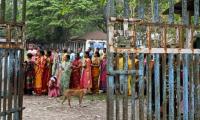Geneva: The Swiss government presented proposals on Friday for broad new restrictions as Covid cases surge, including barring unvaccinated people from restaurants and cultural activities as well as home working requirements.
The government put forward two proposals for new measures aimed at reining in ballooning rates of transmission, and said a final decision would be announced on Tuesday. "I would have liked to say enjoy the holidays," President Guy Parmelin told a news conference, adding though that "unfortunately, the government must once again propose additional measures to stymie a new wave" of infections.
Currently, a so-called Covid certificate -- attesting that the holder has either recovered from Covid, been vaccinated or tested negative -- is required to enter restaurants and a wide range of venues.
But both government proposals would largely shut out unvaccinated people, regardless of whether they hold a negative test. "I am convinced that the vaccine remains our best chance to bring an end to this repeated crisis," Parmelin said, urging all those yet to receive a shot to get one.
Under both government proposals, only people who have recovered from Covid or been vaccinated would have access to indoor cultural and sporting events. Unlike now, they would be required to wear a mask.
In places where mask-wearing is not possible, like restaurants, at nightclubs or in pools, a negative test would be required under one of the scenarios. Under the second, stricter scenario, all such places would be shuttered, the government said.
In both cases, it said working from home should again become compulsory, and university students should return to remote learning. Switzerland, like much of Europe, has been hit by a fifth wave of infections.
The wealthy Alpine nation of some 8.6 million people has so far registered 1.1 million coronavirus cases and over 11,300 deaths. More than 66 percent of the population has been vaccinated.
This week, Switzerland registered over 12,300 new cases in 24 hours -- its highest daily toll since the start of the pandemic. "The epidemiological situation is very critical and it is developing in an unfavourable direction," the government warned in a statement.
It cautioned that pressure was growing again on hospitals and ICUs across the country. The Delta variant of the virus remains dominant, but the government said it feared the new, heavily mutated Omicron variant, which appears to be the most transmissible yet, risked worsening the situation further.
Meanwhile, Germany on Friday passed legislation requiring healthcare workers to get inoculated against Covid-19, a first step toward possible mandatory jabs for all adults. A large majority of Bundestag lower house MPs voted for the measure requiring staff at hospitals, doctors’ offices and care homes to be fully vaccinated by mid-March 2022, which was then approved by the Bundesrat upper house.
The decision follows similar moves by France, Italy, Britain and Greece. Health Minister Karl Lauterbach, who took office this week with the new government under Olaf Scholz, asked deputies from across the political spectrum to support the measure to protect vulnerable groups.
"The pandemic is a mission for us all -- this isn’t a moment for party politics," he told the chamber before the vote. He said he hoped Germany could break a vicious fourth wave of the outbreak by the end of the month so that people could visit their families over the holidays.
"That’s what we’re fighting for," he said, stressing the need to slow the spread of the Delta virus variant and stop the Omicron strain from gaining ground. Scholz, who took power on Wednesday, has come out strongly in favour of mandatory vaccinations after the voluntary campaign fell short with just under 70 percent of the population fully inoculated. Around 21 percent have received a booster shot.
Expanding the mandate to the general public would see the country follow the example of neighbouring Austria, which is requiring vaccinations from February. Angela Merkel’s previous government had always ruled out mandatory vaccination, but calls for action have grown louder in Germany as infection rates hit record highs and hospitals buckle under the strain. Around 89 percent of German care home staff and 90 percent of medical workers are fully vaccinated, according to an official estimate from October, but with wide variation among regions.
"Mandatory vaccination is a really difficult issue," Markus Heim, a senior doctor in the intensive care unit at Munich’s Rechts der Isar hospital, told AFP. "Everyone who works in the medical sector wants more people to be inoculated and if that can be achieved by requiring it then a lot of people working here would support it."
In a related development, South Africa will next month start giving Pfizer booster shots against coronavirus, a health official said Friday, a day after the country reported a near-record high in daily cases of the disease.
"The first people who will qualify for the booster dose in South Africa will be people over the age of 60 years," Dr Nicolas Crisp, director general at the health ministry, told a weekly news conference.
Earlier, the Slovak government allowed shops, ski resorts and churches to reopen on Friday to those who are vaccinated or have recovered from Covid, despite having the highest infection rate in the world.
The EU member of 5.4 million people, which went into partial lockdown late last month, registered 1,099 cases per 100,000 people over the past seven days, according to an AFP tally. The decision to ease restrictions came after public criticism of the government’s policies over not being able to go Christmas shopping or make plans for the holidays.
Meantime, the Downing Street will not hold a Christmas party this year, Boris Johnson’s spokesman said on Friday as the prime minister faced public fury over claims his staff broke rules last year.
"There’s no plans for that in No 10," the spokesman said, linking the decision to Johnson’s announcements on Wednesday that England was progressing to stricter virus rules due to try to stop the spread of the Omicron variant.
Former US president Donald Trump. — AFP NEW YORK: The judge overseeing former US president Donald Trump’s...
Bosnian Serb leader Milorad Dodik. — AFP FileSARAJEVO: The parliament of Bosnia´s autonomous Serb Republic adopted...
Australia's Prime Minister Anthony Albanese speaks during the opening ceremony of the 6th China International Import...
Indonesia's Ruang volcano. — AFP JAKARTA: Indonesia shut a provincial airport and evacuated hundreds of people...
Myanmar’s detained former leader and Aung San Suu Kyi. — AFP LONDON: Myanmar’s detained former leader and Aung...
President Ruto is seen with the chief of the Kenya Defence Forces General Francis Ogolla in this photo on 28 February....







